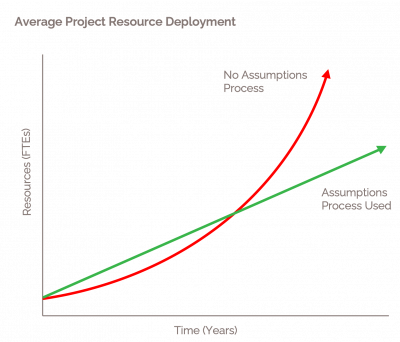Facilitated workshops designed around the concept of Assumptions Thinking help early-stage innovation teams focus their efforts, move faster, and pivot sooner.
Why Assumptions Thinking?
Whether you’re developing a product line extension or a transformative invention, every innovation project begins with a set of assumptions — things we believe to be true. Some assumptions are less important and can be taken for granted, while others are absolutely critical. Identifying, testing, and managing these critical few assumptions early on in a project can have a profound effect on improving the success rate and impact of early-stage innovation.

The basic concept of Assumptions Thinking was originally pioneered by Harvard professor Rita McGrath but has since been widely adopted by innovators who recognize that at the earliest stages of innovation, it pays to emphasize learning and discovery over execution and box-checking. Data from one of our clients, who has applied this methodology across dozens of initiatives, suggests that projects that don’t use Assumptions Thinking are prone to sharp resource spikes and unanticipated pitfalls, while those that do use Assumptions Thinking scale smoothly and efficiently.
How It Works
The Assumptions Workshop is flexible — it may last anywhere from two hours or two days, it can be conducted either virtually or in-person, and the number of attendees may vary (although we don’t recommend more than 15). Duration, location, and participation all drive differences in client-specific facilitation design, as does the maturity of the early-stage innovation program in question: a highly exploratory research concept will need different treatment than a prototype with committed customers waiting impatiently for it.
Nevertheless, there are some common stages: first, there must be an inventory of all assumptions related to the program in question. Then, our sorting and prioritization process surfaces and synthesizes the “killer” assumptions. We guide the group in digging deep into those critical issues, identifying underlying sub-assumptions and mapping dependencies between them (e.g., “In order for X to be true, Y must be true, but Y depends on Z being false”). Finally, the full group may develop in-depth Learning Plans to tackle some of the biggest uncertainties, or Newry might work shoulder-to-shoulder with the program manager or team lead to create a plan of attack. Either way, after the workshop, Newry is available to provide coaching, follow-up workshops, or analytical support by gathering market insight to test key commercial assumptions.
Assumptions Workshops are designed to supplement existing innovation processes by identifying the most critical issues to address, and the cadence of any follow-up workshops can be scheduled to accommodate stage-gate reviews, steering committee meetings, etc. By incorporating assumptions-based thinking into their everyday work, the team can accelerate progress, determine when to pivot to a new focus, and/or justify the next tranche of investment.
